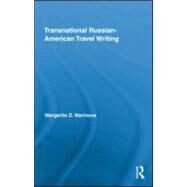- ISBN: 9780415882712 | 0415882710
- Cover: Hardcover
- Copyright: 6/15/2011
This book examines the diverse practices of crossing boundaries, tactics of translation, and experiences of double and multiple political and national attachments, evident in textual products of Russo-American travel encounters during an understudied period (from the end of the American Civil War to the Russian Revolution of 1905) of superficial good will between the two countries.The study brings together published writings, archival materials, and personal correspondence of well or less known travelers of diverse ethnic backgrounds and artistic predilections: from the quintessential American Mark Twain to the Russian-Jewish ethnographer and revolutionary Vladimir Bogoraz; from masters of realist prose such as the Ukrainian-born Vladimir Korolenko and the Jewish-Russian-American Abraham Cahan, to romantic wanderers like Edna Proctor, Isabel Hapgood or Grigorii Machtet. Ultimately, the analyses of chronologically ordered works by these and other Russian and American voyagers to "the other shore" hope to contribute to our comprehension of the processes involved in the invention of the idea of Russia as the archetypal American rival long before Churchill's famous "Iron Curtain" speech in 1946. By highlighting the coming into being and subsequent reification of problematic stereotypes of ethnic and racial difference, they also help us to understand more fully the astonishing success of the Cold War period's rhetoric of mutual hatred and exclusion, and its continuing legacy today.






